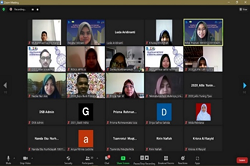Kapabilitas Proses Pelatihan Metode Statistika bagi Mahasiswa Pendidikan IPS Universitas Negeri Malang Capability Process Analysis of Statistical Methods Training for Students of Social Science Education, Malang State University
Main Article Content
Abstract
Statistical methods are required as a tool for data analysis in student-led research projects, such as thesis/final projects. However, many students, particularly those from the Faculty of Social Sciences, Department of Social Studies Education, State University of Malang (FIS-UM), do not comprehend statistical methodologies yet. One way to overcome this problem is to conduct data analysis training on statistical methods. For this reason, the Quality and Productivity Engineering Laboratory, Department of Business Statistics, Faculty of Vocational, ITS, organized a community service program in the form of training for Social Science Education students. Initially, this program was planned to be held using a combination of online and offline training. However, the program was carried out using only online training because of some restrictions on community activities in Java and Bali. In this case, six materials are offered with software practice and assignments. The movement had 202 participants from three batches: 2018, 2019, and 2020. However, participants from batch 2018 can not finish the training due to some reasons. The average learning score (RHB) for the class of 2020 was 84.56, while the RHB for the class of 2019 was 80.85. There was no significant difference in RHB between these two groups using the t-test at a significance level of 5%. In addition, the training process of batch 2020 is capable since the X and MR charts of average learning scores demonstrate a controlled process, with a capability index of 1.55.
Downloads
Article Details
Authors who publish with this journal agree to the following terms:
- Any article on the copyright is retained by the author(s).
- Author grant the journal, right of first publication with the work simultaneously licensed under a Creative Commons Attribution License that allows others to share work with acknowledgment of the work authors and initial publications in this journal.
- Authors are able to enter into a separate, additional contractual arrangements for non-exclusive distribution of published articles of work (eg, post-institutional repository) or publish it in a book, with acknowledgment of its initial publication in this journal.
- Authors are permitted and encouraged to post their work online (e.g., in institutional repositories or on their websites) prior to and during the submission process, as can lead to productive exchanges, as well as earlier and greater citation of published work.
- The article and any associated published material is distributed under the Creative Commons Attribution-ShareAlike 4.0 International License
References
Dinanti, L.A., Wildani, Z., Wulandari, S.P., Retnaningsih, S.M., Wibowo, W., Prastuti, M., et al. 2021a. Kapabilitas Pelatihan Metode Statistika Bagi Guru SMPN Sidoarjo. Society : Jurnal Pengabdian dan Pemberdayaan Masyarakat. 1(2):155–165. https://doi.org/10.37802/society.v1i2.133
Dinanti, L.A., Wildani, Z., Wulandari, S.P., Retnaningsih, S.M., Wibowo, W., Ratih, I.D., et al. 2021. Tingkat Kapabilitas Pelatihan Metode Statistika Model Hybrid Learning di Masa Pandemi Covid-19. Sewagati. 5(2):118–123.
Draper, N.R., Smith, H. 1998. Applied Regression Analysis Volume 326. New Jersey: John Wiley & Sons.
Jana, P., Pamungkas, B. 2018. Pelatihan Penelitian Tindakan Kelas Bagi Guru Sd Negeri Guwosari. Abdimas Dewantara. 1(1):39-46. https://doi.org/10.30738/ad.v1i1.2289
Kurniawati, S., Suryadarma, D., Bima, L., Yusrina, A. 2018. Education in Indonesia: A white elephant? Journal of Southeast Asian Economies. 35(2):185–199.
Montgomery, D.C. 2012. Statistical Quality Control. New Jersey: Wiley Global Education.
Montgomery, D.C., Runger, G.C. 2010. Applied Statistics and Probability for Engineers. New Jersey: John Wiley & Sons.
Muttaqin, T. 2018. Determinants of unequal access to and quality of education in Indonesia. Jurnal Perencanaan Pembangunan: The Indonesian Journal of Development Planning. 2(1):1–23. https://doi.org/10.36574/jpp.v2i1.27
United Nations Educational, Scientific and Cultural Organization. 2014. UNESCO roadmap for implementing the Global Action Programme on Education for Sustainable Development. Paris: UNESCO
Walpole, R.E., Myers, R.H., Myers, S.L., Ye, K. 2012. Probability & statistics for engineers & scientists 9th edition. Boston: Pearson Education Limited.
Wolff, A., Gooch, D., Montaner, J.J.C., Rashid, U., Kortuem, G. 2016. Creating an understanding of data literacy for a data-driven society. The Journal of Community Informatics. 12(3):9-26. https://doi.org/10.15353/joci.v12i3.3275
